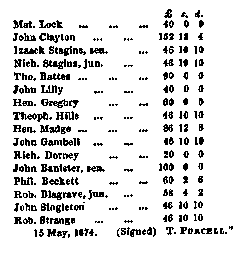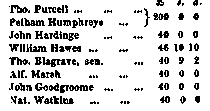Popular Music Of The Olden Time Vol 2
Ancient Songs, Ballads, & Dance Tunes, Sheet Music & Lyrics - online book
| Share page | Visit Us On FB |
|
REIGN OF CHARLES II. 409
Anglo-Saxon gleeman, or minstrel, playing on his "frSele," which has four strings, the two sound-holes, and is played on by a bow; but in shape is more like the half of a long pear, very taper towards the stalk. This shape would have been very inconvenient for reaching high notes, but the use of the upper part of the finger-board was then unknown.*
The reason why viols had been preferred to violins, tenors, and violoncellos, for chamber-music, was simply this: until the reign of Charles II., the music played was in close counterpoint, of limited compass for each instrument, and in from three to six parts, every visitor being expected to take a part, and generally at sight. The frets of the viols secured the stopping in tune, which one indifferent ear in the party might otherwise have marred.
The violin had "a lift into credit" in Cromwell's time, by the arrival in England of Thomas Baltzar, a celebrated performer on that instrument, born at Lubeek. The Hon. Roger North says " he did wonders upon it by swiftness and doubling of notes, but his hand was accounted hard and rough." Evelyn, in his Diary (March 4, 1656), says, "His variety on a few notes and plain ground, with that wonderful dexterity, was admirable. Though a young man, yet so perfect and skilful, that there was nothing, however cross and perplext, brought to him by our artists, which he did not play off at sight, with ravishing sweetness and improvements, to the astonishment of our best masters." Wood speaks of him with equal enthusiasm, and adds that, after his arrival, Mr. Davis Mell, who had been accounted the best violin player in England, was not so admired; " yet he played sweeter, was a well-bred gentleman, and not given to excessive drinking as Baltzar was."
At the Restoration, the King appointed Baltzar leader of his private band of twenty-four; and, about the same time, according to Wood, "he commenced Bachelar of Musick at Cambridge." Baltzar died in 1663, and Charles then appointed John Banister in his place. Banister, however, was afterwards dismissed for saying on his return from France (whither the King had sent him), that the English violins6 were better than the French. At that time, and for many years before, the favorite entertainments of the French court were ballets, |
|||
|
|
|||
|
» This fiddle has heen engraved in Strutt's Sports and Pastimes of the People of England, and in Wackerbarth's Music and the Anglo Saxons, 8vo., 1837.
b The names of Charles the Second's private hand of 24, and the sums they received in the year 1674, which amounted to £1433 17s. 8d., are given in a note at p. 98 of Menu irs of Musick, by the Hon. Roger North, edited by Edward F. Rimbanlt, LL.D., from a document in his possessi n. It is as follows ;—" The Gentlemen of his Majesties Private Musick paid out of the Excheker,— |
 |
||
 |
|||